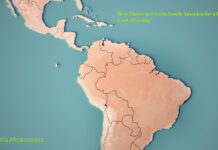Welcome to this post about the challenges and prospect for the African healthcare system, via Afrokonnect. The African healthcare system is one which has faced various challenges and have been marked with promising advancements. Various countries across the African continent are grappling to cope with the inadequate healthcare infrastructure which have plagued their countries. These countries have also witnessed shortage of funds in the health sector and skilled healthcare personnel.
However, various concerted efforts have been established to bolster the healthcare infrastructure in Africa and retain top healthcare professionals. Although, these efforts have been targeted to resurrect the health sector in Africa; the opposite has been the case. This is because the healthcare infrastructure is rapidly declining on the continent with a few exceptions.
Challenges of the Healthcare system in Africa
1) Inadequate Healthcare Infrastructure:
The lack of a sound and effective healthcare infrastructure is rampant among various African countries. Among these include dilapidated buildings, unequipped clinics and hospitals, lack of adequate healthcare facilities, Etc.
2) Shortage in Funding:
The shortage in funds have significantly negatively affected the African healthcare system. Various African countries are unable to allocate adequate resources to the health sector in their countries. This has subsequently led to a shortage of essential medical supplies and the presence of under-equipped healthcare facilities.
3) Shortage of professional healthcare personnel:
Due to the unattractiveness of the health sector in the country, most competent medical professionals are forced to seek for jobs in other climes. This is leading to a massive brain drain in the health sector on the African continent and significantly affected the African healthcare system.
4) The presence of highly infectious diseases:
The African continent is home to various infectious diseases such as Malaria, Ebola, Tuberculosis, Etc. There are certain factors which have contributed significantly to the growth of these ailments, namely:
a) Poor hygiene practices
b) Lack of clean water and adequate sanitation, Etc.
5) Socio-Economic Factors:
These factors play a significant role in limiting access to healthcare services by the citizens. Factors such as Poverty and Inequality create certain barriers which restrict majority of the masses from seeking and receiving medical attention. These factors also significantly affect the African healthcare system negatively.
6) Political Instability and Conflict:
Various African countries and regions have been plagued by wars and conflict which have resulted to political instability in such countries. It is crucial for such countries to address the issue as it has negative effects on the healthcare system of that country.
Solutions to the declining African healthcare system
1) Investment in Healthcare infrastructure:
The main solution to addressing the infrastructural deficit in the health sector is substantial investment. This can be achieved by various African governments collaborating with various international partners and channel funds gotten into the construction and maintenance of various healthcare facilities. It is also important for the government to prioritize the availability of healthcare to those in rural communities. This will help narrow the disparities between the availability of healthcare services in the urban and rural areas.
2) Funding of the health sector:
The health sector in numerous African countries carefully funded as the sector suffers from cuts from the government occasionally in funding. The government should ensure a collaboration with the private sector to attract private investments in healthcare. There should also be a collaboration with various international donors to ensure the transparency and accountability of funds. This would impact the availability of healthcare resources and positively improve the African healthcare system.
3) Health workforce development and retention:
It is necessary to keep hold of the professional and qualified medical practitioners still offering their services on the continent. There should be a need for various comprehensive workforce development strategies. This will ensure the creation of an attractive working conditions for the practitioners. Incentives such as competitive salaries and professional development opportunities will aid significantly in retaining skilled healthcare professionals.
4) Investment in the control of Infectious diseases:
The government of various African countries heavily plagued by infectious diseases must invest significantly in the healthcare system. This will aid in strengthening disease surveillance, developing rapid response mechanisms to an epidemic, and stockpiling of necessary medications and vaccines.
5) Poverty Alleviation and Economic development:
The government of affected states should focus on the massive reduction of poverty in the land and the development of their economy. This will aid in significantly affecting the African healthcare system positively. The government of various African countries can also focus on implementing policies that promote economic growth, job creations, social welfare, Etc. Assistance from international donors can also be crucial to sustaining the push from massive poverty among the masses on the continent.
6) Resolution of Conflicts:
Diplomatic efforts have to be prioritised towards regions affects by political instability and conflict. This can aid in the creation of stable environments which is conducive to healthcare system development. Humanitarian organizations also play a significant role in the provision of healthcare services in conflict zones.
Top 5 Countries in Africa with the worst healthcare system in Africa
1) Central African Republic (CAR):
The country has the worst healthcare system in Africa as the country grapples with the most challenging healthcare landscape in Africa. The country is behind South Sudan in terms of extreme poverty in Africa. The various conflicts present in the country has devastated its healthcare facilities and displaced several of its medical workers. This has resulted in limiting the resources the government can invest to improve the healthcare system in the country.
2) Chad:
The country is suffering from severe re-occurring droughts and food shortage which has severely impact its population. It has led to malnutrition and several health problems for its young populace. The country possesses limited resources hence it can’t fully advocate the growth of its dilapidating healthcare system.
3) South Sudan:
The country is suffering from massive poverty as over 76.4% of its population lives in extreme poverty. This has awarded the country a Global Health Index score of 21.3 out of 100. The country is also plagued by various ailments such as malaria and kalaazar. It also faces a severe deficit of health facilities and has a low number of medical professionals.
4) Somalia:
The country ranks 4th on the highest global poverty rate at 70%. The country’s healthcare sector is suffering massively as only 13% of its $8.733 billion GDP is allocated to healthcare.
5) Lesotho:
The country’s healthcare system is suffering seriously as it battles one of the world’s highest HIV/AIDS prevalence rates. This has ensured that the availability of specialized healthcare in in short supply.
Conclusion on African healthcare system

The African healthcare system stands at a crossroad, one filled with overwhelming challenges and one with notable progress. It will take a lot of effort both locally and international to place Africa’s healthcare system on the right path. The continent must invest heavily in its healthcare facilities and systems to rival that of world powers and prevent the massive brain drain evident in the heath sector. The story of African healthcare system is one of determination and commitment to get Africa bank on the right track. This will be essential to building a more prosperous future for Africa. Thanks for reading and I hope to see you again on Afrokonnect.















